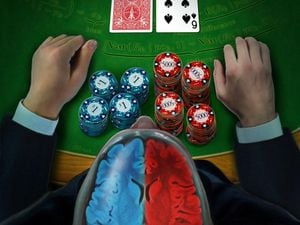Mr Silly versus Mr Sensible: How the two sides of the brain govern risk taking
Right and left brain hemispheres fight it out to force us to embrace or avoid risk, according to new research.

A tug of war takes place between the right and left side of the brain when we gamble or make risky decisions, research has shown.
The high-rolling right brain pushes us to take a chance while the sensible left urges us to hold back.
Which one wins partly depends on previous experience.
A recent spate of successful bets or decisions that pay off in everyday life creates a “bias” that translates into more risk-taking even in the face of poor odds , the scientists found.
Conversely, a bias in the other direction will cause the “sensible” brain to dominate and make a person risk-averse.
Dr Pierre Sacre, from Johns Hopkins University in the US, who co-led the study, said: “When your right brain has high-frequency activity and you get a gamble, you’re pushed to take more of a risk.
“But if the left side has high-frequency activity, it’s pulling you away from taking a risk. We call this a push-pull system.”
The scientists studied patients who had electrodes implanted in their brains to locate the source of seizures.
The same electrodes allowed the researchers to analyse brain activity in real time as the group took part in a computerised card game.
Participants were shown two cards on a computer screen, one face up and the other face down.
They had to bet low or high, staking five dollars or 20 dollars, that their card had a higher value than the computer’s hidden one.
Lead researcher Professor Sridevi Sarma, also from Johns Hopkins University, said: “What we learned is that there is a bias that develops over time that may make people view risk differently.”
A mathematical equation developed by the team successfully calculated each patient’s bias based on their past wagers.
Prof Sarma added: “Over time, the players are accumulating all the past card values and all the past outcomes, but with a fading memory.
“In other words, what happened most recently weighs on a person more than older events do.
“This means that based on the history of a participant’s bets, we can predict how that person is feeling as they gamble.”
The findings are published in the journal Proceedings of the National Academy of Sciences.





